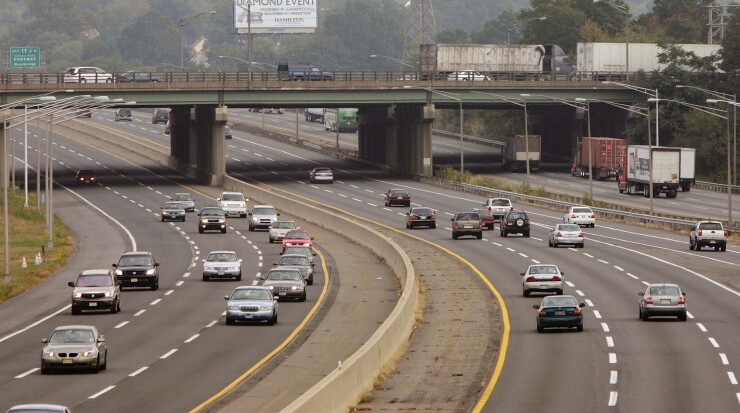The New Jersey Turnpike Authority is planning a private placement bond refinancing to make up for operating revenue losses suffered during the COVID-19 pandemic.
Diane Gutierrez-Scaccetti, who chairs NJTA’s board of commissioners, said last week the transportation agency would soon sell roughly $259 million of turnpike revenue bonds to refund outstanding debt with principal payments due in 2020 and 2021. Gutierrez-Scaccetti, who is also commissioner of the New Jersey Department of Transportation, said the transaction aims to provide NJTA with "cash flow relief" related to plummeting toll revenues caused by efforts to halt the virus.

NJTA spokesman Thomas Feeney said Thursday the agency plans to execute the private placement bond transaction in June. Bids from interested banks are due Friday, according to Feeney.
“New Jersey toll roads have experienced significant economic and operational impacts since the onset of COVID-19,” said Gutierrez-Scaccetti during a May 21 online news conference hosted by the International, Bridge, Tunnel and Turnpike Association.
NJTA, which operates the New Jersey Turnpike and Garden State Parkway, last entered the market in January 2019 with a $449 million revenue bond transaction to finance final stages of a $7 billion 10-year capital program. The agency is rated A2 by Moody’s Investors Service, A by Fitch Ratings and A-plus by S&P Global Ratings.
"To the extent that the NJTA can access the capital markets to provide savings/budgetary relief given the current crisis, I think that is a good thing, even if it would be frowned upon in normal times," said Lisa Washburn, managing director at Municipal Market Analytics. "The degree of the impact on credit quality will not be known for a while but will depend on how long traffic volumes remain constrained and how they bounce back during the recovery."
Year-over-year toll revenues for the New Jersey Turnpike and Garden State Parkway fell 61.6% in April after Gov. Phil Murphy instituted a stay-at-home order on March 21 closing non-essential businesses, according to Gutierrez-Scaccetti. For a four-month period from Jan. 20 through April 20, NJTA traffic is down by 45.3 million toll transactions with revenues dropping by $109 million during that time, she said.
NJTA commissioners voted unanimously Wednesday to raise tolls 36% on the New Jersey Turnpike and 27% on the Garden State Parkway to fund $24 billion in capital projects over the next 20 years. The agency last raised tolls in 2012 in two steps as part of its 2008 financial crisis recovery plan.
“They are coming off a large, multi-year capital program and have other capital needs going forward, which this toll increases positions them for,” said S&P credit analyst Kurt Forsgren. “In general, S&P Global Ratings views regular, predictable, indexed or comparatively small toll rate adjustments as a credit positive.”
Gov. Phil Murphy said he supports the rate hikes during his daily COVID-19 news briefing Wednesday, citing capital improvements needed on both highways.
The NJTA suspended toll cash collections from March 24 through May 18 as a precaution against the spread of COVID-19. All transactions during that nearly two-month period were conducted via E-ZPass or through a temporary toll-by-mail process.
Declining traffic on New Jersey’s roads raises the prospects of the state hiking its current gas tax rate of 41.4 cents per gallon later this year in order to comply with a 2016 law mandating a steady stream of fuel revenue to support the state’s Transportation Trust Fund. The eight-year $16 billion TTF re-authorization bill signed by former Gov. Chris Christie requires the state treasurer to determine every August whether gas tax revenues have met the minimum amount needed to avoid a deficit.
“It's formulaic so … that will determine whether we have to raise or decrease the gas tax effective October,” New Jersey State Treasurer Elizabeth Maher Muoio said during Murphy's May 22 COVID-19 press briefing. “We'll work with the Office of Legislative Services in August to look at the numbers.”
New Jersey’s gas tax was raised 23 cents a gallon under the 2016 legislation and upped again by 4.3 cents in 2018. The Garden State's gas tax still remains lower than the neighboring states of New York (45.9 cents per gallon) and Pennsylvania (58.7 cents), according to the Tax Foundation.





